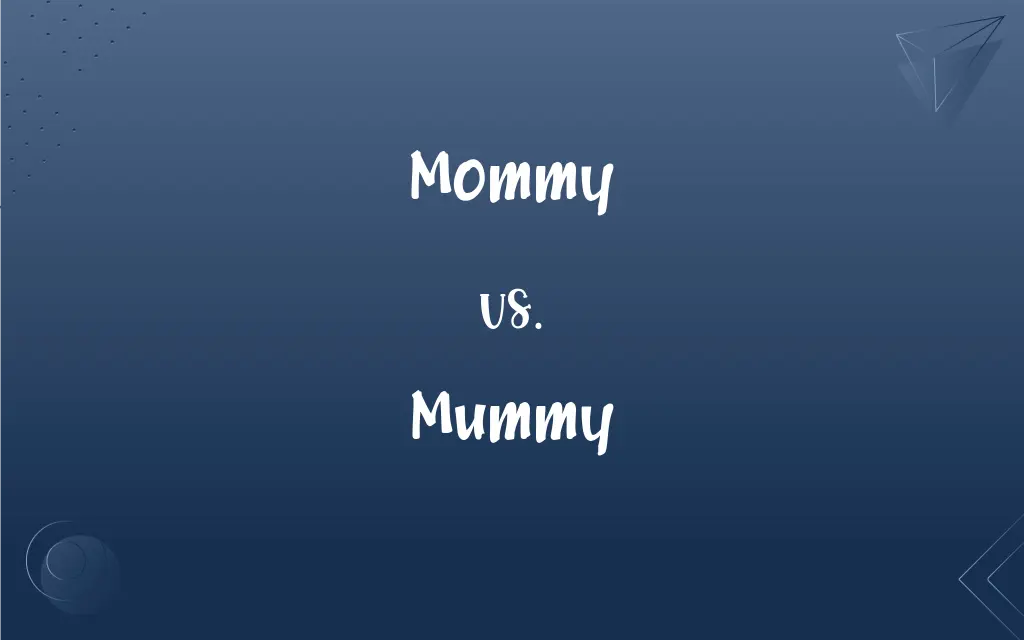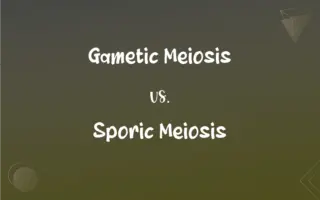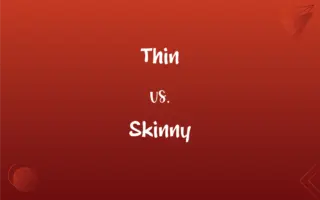Mommy vs. Mummy: What's the Difference?
Edited by Harlon Moss || By Janet White || Updated on October 3, 2023
Mommy is an affectionate term for mother, while Mummy is either a preserved dead body or a British term for mother.

Key Differences
Mommy and Mummy both revolve around the concept of mothers, yet their primary meanings and uses diverge significantly. In American English, "Mommy" is a tender, colloquial term children often use to address their mothers. It signifies warmth, love, and a close mother-child relationship. On the other hand, the primary meaning of "Mummy" in American English pertains to a preserved dead body, especially one from ancient times, wrapped in cloth.
However, if we cross the Atlantic and delve into British English, the scenario changes slightly. While Americans fondly call their mothers "Mommy", the British often use "Mummy" in a similar affectionate manner. This British usage might seem odd to Americans, where the image of an ancient, preserved corpse comes to mind with the term "Mummy".
Interestingly, the words' etymologies diverge. "Mommy", like "Mum", "Mama", and similar variations, likely evolved from baby-talk, where repetitive ma-ma sounds are prevalent. "Mummy", referring to the preserved body, is derived from the Arabic "mūmiya", relating to embalmed bodies and the bituminous substances used in the preservation process.
Ultimately, context is paramount. In a U.S. setting, if a child calls out for "Mommy", they're seeking their mother. But in a museum, if someone points to a "Mummy", they're likely indicating an ancient artifact, not a parent—unless, of course, you're in the U.K., where it might be either!
Comparison Chart
Primary Meaning (US)
Affectionate term for mother
Preserved dead body
ADVERTISEMENT
Primary Meaning (UK)
-
Affectionate term for mother
Origin
Likely evolved from baby-talk
Derived from Arabic "mūmiya"
Common Context (US)
Familial settings, between parent and child
Museums, history lessons about ancient civilizations
Relation to Motherhood
Directly refers to a mother in an affectionate way
Can refer to mother in UK, unrelated in the US context
Mommy and Mummy Definitions
Mommy
A term suggesting closeness and dependence with a mother figure.
After the fall, he wanted his mommy to comfort him.
ADVERTISEMENT
Mummy
A term associated with ancient civilizations, like Egypt.
The mummy's tomb was discovered after decades of research.
Mommy
An affectionate term children use for their mother.
Sarah called out for her mommy when she got scared.
Mummy
A body that has been preserved, especially from ancient times.
The museum displayed a mummy from ancient Egypt.
Mommy
Informal reference to one's mother, especially by young kids.
Tommy gave the drawing to his mommy with a big smile.
Mummy
The dead body of a human or animal that has been embalmed and prepared for burial, as according to the practices of the ancient Egyptians.
Mommy
Represents a nurturing maternal figure in familial context.
Every night, Jenny's mommy read her a bedtime story.
Mummy
A withered, shrunken, or well-preserved body that resembles an embalmed body.
Mommy
A colloquial expression indicating maternal warmth.
The lost kitten seemed to be looking for its mommy.
Mummy
Mother.
Mommy
A mother.
Mummy
(countable) An embalmed human or animal corpse wrapped in linen bandages for burial, especially as practised by the ancient Egyptians and some Native American tribes.
Mommy
Mother.
Mummy
A reanimated embalmed human corpse, as a stock character in horror films.
Mommy
To treat someone like a mother would; to mother someone.
Mummy
Any naturally preserved human or animal body.
Mommy
Characteristic of a mother; motherly.
She is the mommiest of mommies.
Mummy
A brown pigment originally prepared from the ground-up remains of Egyptian animal or human mummies mixed with bitumen, etc.
Mummy brown
Mommy
Informal terms for a mother
Mummy
A pulp.
Mummy
A substance used in medicine, prepared from mummified flesh.
Mummy
A sort of wax used in grafting.
Mummy
Mother.
Mummy
To mummify.
Mummy
A dead body embalmed and dried after the manner of the ancient Egyptians; also, a body preserved, by any means, in a dry state, from the process of putrefaction.
Mummy
Dried flesh of a mummy.
Mummy
A gummy liquor that exudes from embalmed flesh when heated; - formerly supposed to have magical and medicinal properties.
Mummy
A brown color obtained from bitumen. See Mummy brown (below).
Mummy
A sort of wax used in grafting, etc.
Mummy
One whose affections and energies are withered.
Mummy
To embalm; to mummify.
Mummy
Informal terms for a mother
Mummy
A body embalmed and dried and wrapped for burial (as in ancient Egypt)
Mummy
In British English, an informal and affectionate term for mother.
Mummy, can we have ice cream after dinner?
Mummy
A relic or artifact related to historical preservation techniques.
The archaeologist studied the mummy for clues about burial rituals.
Mummy
Wrapped in bandages and associated with various mythologies.
In the movie, the mummy came to life and roamed the corridors.
FAQs
Do both Mommy and Mummy refer to mothers?
In American English, "Mommy" refers to a mother; "Mummy" can mean a preserved body or, in British English, a mother.
Can "Mummy" mean a preserved body in the U.K. too?
Yes, in the U.K., "Mummy" can refer to both a mother and a preserved body, depending on context.
Are there any other meanings for "Mommy" and "Mummy"?
While both primarily relate to mothers or preserved bodies, their meanings can vary slightly based on cultural or regional nuances.
Are these terms used in formal writing?
"Mummy" for preserved bodies can appear in formal contexts. "Mommy", being colloquial, is less common in formal writing.
How does one differentiate between the two terms in the U.K.?
Context is key. The surrounding conversation or setting usually clarifies whether "Mummy" refers to a mother or a preserved body.
Does "Mommy" have any historical connotations like "Mummy"?
No, "Mommy" is primarily an affectionate term for mother, without the historical connotations of "Mummy".
Do other languages have similar distinctions in words for mothers and mummies?
While many languages have distinct words for mothers, the specific duality of "Mummy" in English is more unique.
What's the origin of the word "Mummy" relating to preserved bodies?
It's derived from the Arabic "mūmiya", related to embalming and preservation.
Which term, between Mommy and Mummy, is more common in the U.S. for addressing mothers?
In the U.S., "Mommy" is the common term for addressing mothers.
Can adults use the term "Mommy" or is it reserved for children?
While more common among children, adults can use "Mommy", especially in familial or affectionate contexts.
Which term has a broader cultural or historical significance?
"Mummy", due to its association with ancient civilizations and preservation techniques, has broader historical significance.
How are the two terms pronounced?
While both sound similar, "Mommy" typically has a more pronounced "o" sound, while "Mummy" often has a more muted "u" sound.
Is the British use of "Mummy" for mother fading?
It's still prevalent, though terms like "Mum" are also popular.
Can "Mummy" be used in a humorous context in the U.K.?
Yes, like "Don't tell Mummy!" when indulging in a treat.
What’s the common way for American children to call their mothers?
American children commonly use "Mommy", "Mom", or "Mama".
Are there mummies outside of Egypt?
Yes, mummies have been found worldwide, including in places like Peru and China.
In American literature, would "Mummy" ever mean mother?
It's uncommon. In American literature, "Mummy" usually references the preserved body.
Are there any famous mummies in history?
Yes, notable ones include King Tutankhamun and the Ice Maiden.
How did "Mommy" evolve in American English?
It likely evolved from baby-talk, resembling sounds like "Mama".
Are there films or books where "Mummy" refers to both meanings?
While both meanings have been explored in media, they're usually distinct. For instance, "The Mummy" film series focuses on the preserved body.
About Author
Written by
Janet WhiteJanet White has been an esteemed writer and blogger for Difference Wiki. Holding a Master's degree in Science and Medical Journalism from the prestigious Boston University, she has consistently demonstrated her expertise and passion for her field. When she's not immersed in her work, Janet relishes her time exercising, delving into a good book, and cherishing moments with friends and family.
Edited by
Harlon MossHarlon is a seasoned quality moderator and accomplished content writer for Difference Wiki. An alumnus of the prestigious University of California, he earned his degree in Computer Science. Leveraging his academic background, Harlon brings a meticulous and informed perspective to his work, ensuring content accuracy and excellence.































































